2022 IMPACT REPORT






300 5th Avenue Suite 211 | Washington DC 20319 - 5066
P: 202.685.3800 | www.ndufoundation.org
I’m pleased to share the Foundation’s 2022 Impact Report, which features our programs, colloquia, and accomplishments. As we celebrated and commemorated 40 years of supporting the National Defense University (NDU), we accelerated our impact and continued our mission to ensure the University remains the global standard for world-class professional military and diplomatic education.
• The College of Information and Cyberspace CyberBeacon Conference brought global cybersecurity experts and professionals to the NDU community. CyberBeacon is a prime example of how the Foundation and the NDU operate at the intersection of the security environment, creating a strategic advantage.
• We convened Joint All Domaine Command and Control (JADC2) thought leaders through our Industry Innovation Series. Greg Wenzel, Executive Vice President, Booz Allen Hamilton, shares his insights on the conference discussions and perspectives.

• With support from the NDU Foundation, NDU hosted its Alumni Continuing Education Security Seminar (ACESS). The event brought together the NDU International Fellows Program alums and demonstrated the importance and impact of professional military education on national security and global diplomacy.
All of this has been possible for forty years only with the support of our Board of Directors, our McNair Partners, and well-informed donors who understand the critical importance of developing senior leaders as a national security imperative. With your continued support, our vision is to grow NDUF’s impact on national security leader development and international relationship development because we recognize these emerging leaders are our most vital national security assets.
Looking forward to 2023, the Foundation plans to engage a broader cross-section of corporate partnerships through the Chairman’s Advisory Group, emphasizing our role as catalysts and accelerating the global leadership and impact of the National Defense University. We appreciate your trust, support, and partnership with our mission.
Sincerely,
James Schmeling President & CEOThe National Defense University Foundation hosted National Security & Innovation Briefings to engage senior private industry experts and military and public sector officials on issues vital to global and national security. Topics and themes connect NDU students, DoD personnel, and the Defense Industrial and National Security Innovations Bases with world-class thoughtleadership opportunities.
Yovanovitch is a Senior Fellow in the Russia and Eurasia Program at the Carnegie Endowment for International Peace. She joined ISD as a Senior State Department Fellow in the spring of 2019 after three years as the U.S. Ambassador to Ukraine (2016-2019). In addition, Ambassador Yovanovitch is a member of the NDU National Hall of Fame, former deputy commandant of the Dwight D. Eisenhower School for National Security and Resource Strategy, and a 2001 graduate of the National War College.
Alessandro Profumo, Chief Executive Officer, Leonardo SpA, discussed with the NDUF and NDU communities the importance and implications of “Trans-Atlantic Defense Industrial Cooperation, Achieving NATO Interoperability and Government-Industry Partnerships.”
The National Defense University and NDU Foundation convened a McNair Colloquium featuring a moderated discussion with Ambassador (ret.) Marie Yovanovitch, author of Lessons from the Edge. Ambassador

Dr. Fiona Hill, the Robert Bosch Senior Fellow at the Center on the United States and Europe in the Foreign Policy program at the Brookings Institution, facilitated a discussion with Dr. Jeffrey Mankoff, Distinguished Research Fellow at the U.S. National Defense University’s Institute for National Strategic Studies. The NSB title discussion focused on Dr. Mankoff’s recent book, “ Eurasia: How Imperial Legacies Shape International Security.”
For additional information on Innovation Series and National Security

Briefing opportunities, contact James Schmeling, Foundation President, at schmeling@ndufoundation.org.


The NDU Foundation secures funding and resources to support the academic and professional development programs for senior military and diplomatic leaders attending NDU. Our partnerships offer relevant opportunities and engagement into current national security issues, allowing business and military leaders to adapt operational strategies to match better the priorities and objectives of DoD, Homeland Security, and other agencies charged with our national security.
Recently, the Foundation provided staff and other resources to support the annual flagship conference of the College of Information and Cyber Space at the National Defense University, CyberBeacon 2022.


Congressman Jim Langevin was recognized with the inaugural National Defense University Foundation President’s Award for Significant Contributions to National Security. Congressman Langevin’s work on behalf of senior professional military education in the cyber and information domains, his service as Chairman of the Subcommittee on House Armed Services Committee on Cyber, Innovative Technologies, and Information Systems, and his work as a commissioner of the Cyber Solarium Commission has created a lasting impact on our national security advancements.

Dr. Trey Herr, Director of Cyber Statecraft Initiative at the Atlantic Council, participated on the “Ukraine and other Recent Campaigns” panel with Annette L. Redmond, Deputy Assistant Secretary for Intelligence Policy and Coordination, Intelligence and Research Bureau, Department of State, Jayce Nichols, Vice President, Threat Intelligence, Mandiant, Michael Warner, Ph.D., Command Historian at U.S. Cyber Command, and Aaron Brantly, Associate Professor of Political Science and Director of the Tech4Humanity Lab at Virginia Tech.
The Managing Challenges of Emerging and Disruptive Technologies panel featured Kevin Mulligan, Senior Manager of Government Affairs and Public Policy for Google Cloud and Google Public Sector, Perri Adams, Program Manager, DARPA, Christopher Cleary, Principal Cyber Advisor, Department of the Navy and Michael Kilpstein, Ph.D., Chief of Staff, Office of the U.S. Army Principal Cyber Advisor.
Sophia D’Antoine, Managing Partner, Margin Research, Alexei Bulazel, Winnona DeSombre, Fellow at the Atlantic Council Digital Forensics Research Lab, and Cheri Caddy (Director, Cyber Policy and Plans and Senior Advisor to the National Cyber Director, White House, spoke on Capabilities and Arsenal Management. Cyber experts from government, leading academic institutions, and corporate America
participated on the Intelligence, Persistence, and Strategy panel, including Emily Goldman, Ph.D., U.S. Cyber Command, Jon Lindsay, Ph.D., Associate Professor at the School of Cybersecurity and Privacy at the Georgia Institute of Technology, Dave Aitel, Cordyceps Systems, and Thomas Rid, Ph.D., Professor of Strategic Studies and founding director of the Alperovitch Institute for Cybersecurity Studies at Johns Hopkins University’s School of Advanced International Studies (SAIS).
We extend heartfelt appreciation to NUD Foundation Board Member Michael Moniz and Circadence for their generous support of CyberBeacon 2022

Rules-Based International Order: What’s at Stake in the Indo-Pacific and Beyond?
Over 100 representatives from 20 graduating classes and 45 countries attended ACESS 2022.

In August, the NDU hosted its 15th Alumni Continuing Education Security Seminar (ACESS) in Sydney, Australia. With funding from the NDU Foundation, more than 80 U.S. and partner nation leaders gathered for a week-long engaging academic program. The educational program was executed by faculty from across the University and featured plenaries focusing on a wide range of topics, small-group seminar discussions, and elective sessions.
The NDU Foundation supports engagements like ACESS to ensure NDU remains the premier institution bringing together members of the military, the government, civilians, and industry and helping shape tomorrow’s national security leaders.

Australian Army retired Major General Mick Ryan was the ACESS 2022 keynote speaker. His expertise includes military history and strategy, advanced technologies, organizational innovation, complex adaptive systems, and adaption theory .
We invite you to stay engaged and work with us to ensure NDU has the resources and expertise to continue delivering the world’s best professional military and diplomatic leader development program.
Our mission is to support the efforts of the National Defense University by bringing together cutting-edge experts, programs, and partners to deliver a world-class experience for students and faculty.
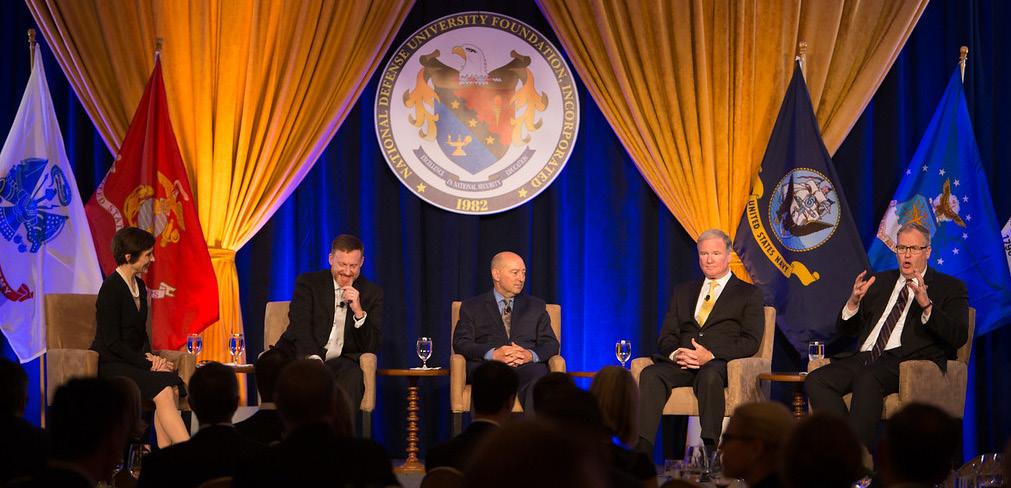
One way we do this is through our McNair Strategic Partnership - our partners are a select group of leaders within their industries and are made up of more than 25 organizations such as Boeing, McKinsey & Company, Thales, IBM, Leidos and others.
Through our McNair Strategic Partnership we invest and fund opportunities including: faculty excellence and research, student success and research experience and international relationships.
If you are interested in partnering with us to support and advance the work of the National Defense University, learn more about the McNair Strategic Partnership here: ndufounation.org.

Hosted at the National Defense University, National War College, the Foundation’s annual D-Day + 78 Remembrance Reception brought together key members of the defense community to commemorate the men and women who served during the D-Day Invasion.
Artifacts from the private archives of Major General Milnor Roberts, generously donated by his wife Priscilla, were on display including the original plans of Operation Neptune detailing
the plans for the naval and airborne assault on D-Day.
Remarks were provided by Lt. Gen. Michael Plehn, USAF, President, National Defense University, Brig. Gen. Jeff Hurlbert, USAF, 32nd Commandant of the National War College, Bryon Greenwald, Ph.D., Professor and Deputy Provost, National Defense University, and James Schmeling, President & CEO, National Defense University Foundation.
On June 6, 1944, Allied forces landed on the coast of Normandy in what was the start of the campaign to liberate Europe in World War II. Now, 78 years later, ceremonies are still held throughout the United States, in Great Britain, and in France to commemorate this seminal battle that changed the course of history.
Today, D-day is remembered by many as the beginning of the end of World War II, but in the early hours of June 6, success was not a certainty. After years of fighting and strategic planning, the stakes were enormous for the more than 156,000 Allied service members who crossed the English Channel that day. Over 4,000 lives would be lost in taking the beaches at Normandy and the ensuing battle to gain ground.
The operation, code named “Overlord,” was years in the planning and was most noted for the strategic contributions of its leadership. The men assigned with planning Operation Overlord were tasked with decisions such as determining how many men would land on each beach, which ships would be used to cross the English Channel, what supply chain logistics to use to ensure adequate food and medication, and establishing secure lines of communication.
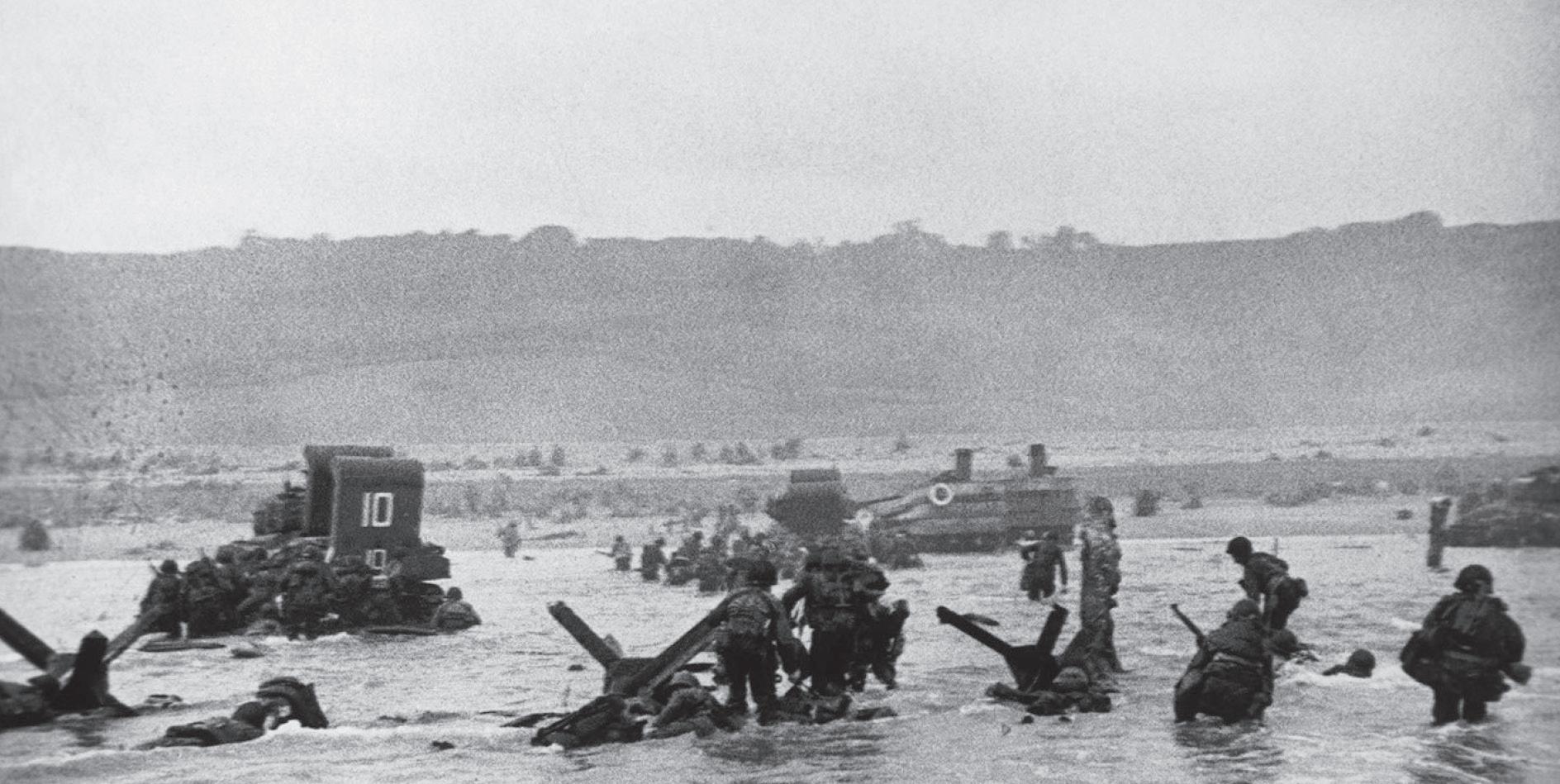
The right leadership was essential, and as we gather this year to commemorate that effort, we are reminded that in a worst-case scenario, NDU is charged with educating the men and women who would be similarly charged with the grave responsibility to plan the military response to any action that threatens the national security of the United States.
Gen. Dwight D. Eisenhower encouraged Allied soldiers taking part in the D-day invasion of June 6, 1944, reminding them, “The eyes of the world are upon you,” before they embarked on “a great crusade.”

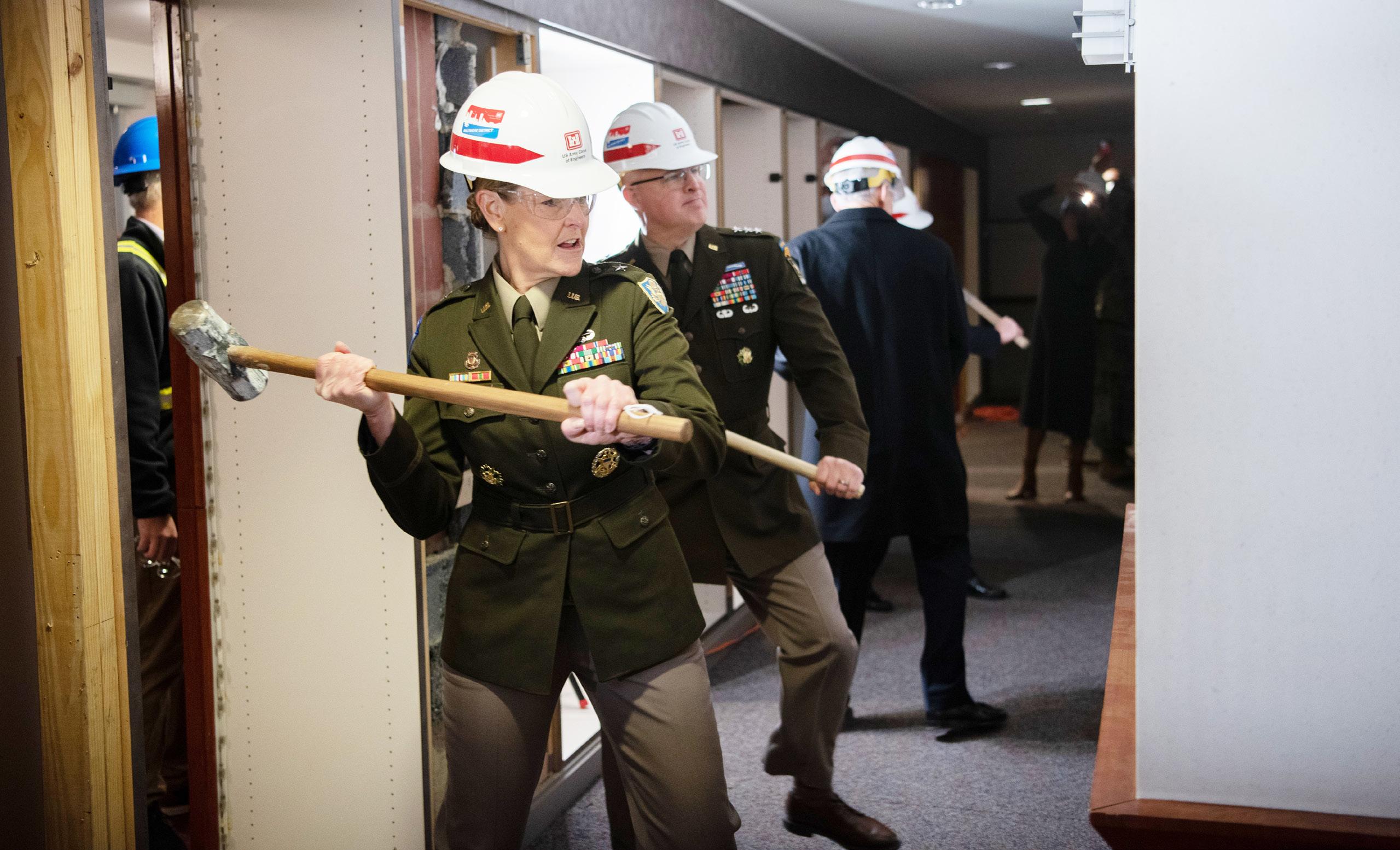
Eisenhower Hall was built in 1960 as a 4-story building with approximately 130,000 square feet. At 62 years old, the last major renovation was completed in 1998, which included mechanical system upgrades and a force protection blast film added to the original windows. The exterior walls have no insulation or vapor barrier, and the chillers are over a decade old. In 2019 due to delayed expenditures, water intrusion, a mold bloom, and air quality concerns, the NDU President made the decision to evacuate the building.
The Eisenhower School’s nearly 400 students, faculty, and staff then relocated into NDU’s remaining buildings, with 80% less space, which resulted in a sub-optimal learning environment. This impacted not just the Eisenhower School, but also the College of Information and Cyberspace, the College of International Security Affairs, the Institute for National Strategic Studies, and the three Regional Centers as we
crowded into their spaces. In the true spirit of NDU, we made it work, but at some cost to the student experience and the work environment for a large swath of the NDU team.
Since 2019, NDU has been on an upward trajectory made possible public-private support. In 2020 the US Army Corps of Engineers completed a 10-year capital investment strategy for NDU’s Fort McNair campus, identifying $153 million in facilities repair, sustainment, and maintenance required from now through Fiscal Year 2030. This included the immediate need for $52M in FY22 funding to begin repairs on this building. In the larger context of the DoD budget, that might not seem to be a tremendous number, but it represented more than half of NDU’s total annual budget, so there was no way that NDU could afford that bill.
As NDU pursued support for this project, Army Materiel Command provided $3 million in design
funding, which allowed the renovation project to be advertised for contract in January of this year. The resulting design included more than 500 drawings and 2,000 pages of specifications to address the root causes of the issues affecting this building. Interestingly, the cost to replace this building was estimated at $107 million. And that’s where Congress stepped in, providing $50 million to the Army for NDU facilities.
This year, the Army funded and let the renovation construction contract. Currently, the contractors are moving into high gear, stripping down the exterior of the building, removing much of the interior, replacing the HVAC, electrical, plumbing, and other systems, and preparing this building to host the national security leaders who will study here for many decades to come.
So, with a few swings of the sledgehammers, NDU embarks on the next leg of the Eisenhower School journey. And, if all goes to plan, this project will be complete in time to celebrate the 100-year anniversary of this esteemed college and our students will be back in these classrooms by February 2025 .




The National Defense University (NDU) Special Collections Library has acquired former Joint Chiefs of Staff Chairman and former Secretary of State General Colin Powell’s archives from Mrs. Alma J. Powell.

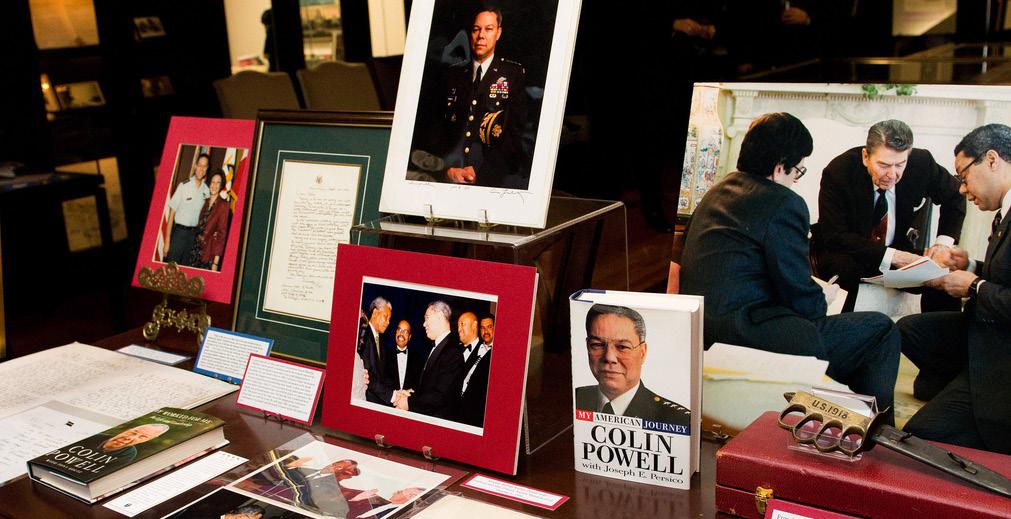
Gen and Mrs. Powell had a long-standing and cherished relationship with NDU since his time as a student at the National War College. The Powell Collection includes a standing desk, childhood and family photographs, speeches, correspondence, artist renderings, memorabilia and military uniforms, and a diary and photos from Gen Powell’s service in Vietnam.
“General Powell often said NDU, and the National War College in particular, had a profound impact on his career and life,” said Susan Lemke, Special Collection Librarian at the National Defense University. “Throughout his career, General Powell returned to the University. Of course, he continued to lecture and often brought students from middle and high schools in New York City. He was devoted to inspiring young people to create their own legacies of service and leadership.”
The NDU Library Special Collections, Archives, and History is the repository for personal papers, rare books, historical photographs, maps, prints,
artifacts, university archives, and local historical materials. The manuscript collection contains primarily biographical and personal papers of 20th-century military and diplomatic leaders, emphasizing those of former Chairmen and Vice-Chairmen, Joint Chiefs of Staff, Supreme Allied Commanders, Europe, and other Combatant Commanders.
Archival collections from the Hudson Institute, the Presidential Commission on Women in Combat, the Title V Report to Congress on the Conduct of the Persian Gulf War, Civil Affairs in the Persian Gulf, the Skelton Panel on Military Education, and GoldwaterNichols legislation are available for research in Special Collections. A select
collection on the Lincoln assassination, and the trial and execution of the Lincoln conspirators, includes unique ephemera such as a memorial fan illustrating events leading up to and after the assassination and a signed pass to the trial.
“The collections cover a diversity of topics historically speaking and liberally accepts collections because the university wants to nurture accessibility,” said Lemke.
The Special Collections focus on biographical history. A thriving exhibition program supports the university’s curriculum and features
“We invite collections from our alumni, faculty, and staff. They are a vital part of our learning legacy. We welcome their contributions to continuing NDU’s legacy. We want to exhibit items that propel future knowledge. All items are incorporated into exhibits and the experiential learning environment to support our students. Intellectual goods, papers, and books are intentionally accessible to all scholars. Their stories and lives become a part of this place forever. We want to use their lives to inspire our students through learning enrichment,” said Gower.
distinguished individuals or special events/ anniversaries. In addition to Gen Powell’s collection, exhibits in Special Collections feature Gen Maxwell D. Taylor, USA (Ret.), Gen John W. Vessey, USA (Ret.), and AMB (ret) Donald Yamamoto.


“We exhibit items from people connected to NDU. We preserve and share their legacies with our students, faculty, visiting scholars, and the public to inspire them. The student papers, lectures, and university materials build a legacy of knowledge and learning. We ensure those legacies are tangible and available for students, scholars, and the public. Much of what we have is digitized, so it’s very accessible,” said University Archivist Scott Gower.
In addition to providing historical resources, the NDU Special Collections staff offers historical walking tours. Seeking to preserve and provide access to these national treasures, the Library’s Special Collections is a vital resource for research and a portal to our nation’s heritage.
The Powell Family and the NDU Special Collections Library intend to collaborate with collections and exhibits at Colin Powell School for Civic and Global Leadership at the City College of New York and the National Museum of African American History and Culture to ensure broad and ongoing engagement with the Powell Special Collection.

Individuals and families considering donating to the National Defense University Special Collections can contact: James Schmeling at schmeling@ndufoundation.org.
Learn more about the NDU Special Collections at https://www.ndu.edu/ Libraries/Manuscript-Collections
The National Defense University Foundation hosts National Security Briefings to convene and engage senior private industry experts, military, and public sector officials on issues vital to national security – especially in the areas of technological transformation and innovation for warfighting, defense, national security, and diplomacy.
Topics and themes provide National Defense University (NDU) professional students and faculty, DoD personnel, the Defense Industrial Base, and the National Security Innovation Base with ample opportunities for world-class learning and engagement environments.
Wednesday February 22, 2023
2:00 P.M – 3:00 P.M. ET VIRTUAL ONLY
Space Superiority: Space Operations Command plan of action to deter conflict, preserve peace and our military’s freedom of action in space.


Join the National Defense University Foundation and Lt. Gen. Whiting, Commander, Space Operations Command for an in depth look at the threats and challenges our nation is confronting in space. For decades, the U.S. has been the most dominant space power, but that dominance has been challenged. USSF conducts operations in, from, and to space to deter conflict; deliver space combat power for the joint force, allies and partners; and defeat aggression, if necessary. Learn more about how Space Operations Command continues to collaborate with allies, industry partners and inter-government agencies to deter conflict, preserve peace and strengthen our military freedoms in space. Strength is gained through partnering.
Register at: https://attendee.gotowebinar.com/register/4238204337218859615
Wednesday March 22, 2023
8:00 A.M – 1:00 P.M. ET
Limited Space Available.
Please RSVP by March 15th
CYBER SUMMIT
Ensuring Cyber Superiority through Collaboration and Cooperation


Presented by the National Defense University Foundation in cooperation with Booz Allen Hamilton.
We cordially invite you to join us for this exclusive hybrid event convening military services, DoD, DHS, and other agency leaders from multiple federal agencies for a morning of thought leadership, perspective, in an academic setting with Chatham House Rule. This interactive dialogue will discuss key topics on how together we can obtain and secure the Cyber Battlespace.
Location: National Defense University
Fort Lesley J. McNair, Washington D.C., 20319 Marshall Hall, Room 155
Discussion Topics: Policy, Technology, Current & Future Threats

To Register and Attend in-person: https://www.eventbrite.com/e/ensuring-cyber-superiority-throughcollaboration-and-cooperation-tickets-516836179927

For questions or to attend virtually contact Schmeling@ndufoundation.org
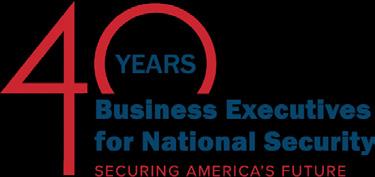
Presented by the National Defense University Foundation in cooperation with Business Executives for National Security (BENS) and PRISM, NDU’s Journal of National and International Security
March 28th: 8:00 A.M – 5:00 P.M. ET
Tuesday, March 28, 2023
8:00 A.M – 5:00 P.M. ET
Wednesdsy, March 29, 2023
8:00 A.M – 1:00 P.M. ET
Presented by the National Defense University Foundation in cooperation with Business Executives for National Security (BENS).
To Register and Attend in-person: https://www.eventbrite.com/e/corporate-national-security-responsibilitysummit-tickets-517805619547
March 29th: 8:00 A.M – 1:00 P.M. ET
For questions or to attend virtually contact Schmeling@ndufoundation.org
Boeing Corporate Headquarters 929 Long Bridge Drive | Arlington, VA, 22202
Hosted at: Boeing Corporate Headquarters, 929 Long Bridge Drive, Arlington, VA, 22202
Presented by the National Defense University Foundation in cooperation with Business Executives for National Security (BENS) and PRISM, NDU’s Journal of National and International Security
March 28th: 8:00 A.M – 5:00 P.M. ET
March 29th: 8:00 A.M – 1:00 P.M. ET
Boeing Corporate Headquarters
The NDU Foundation, in partnership with Business Executives for National Security (BENS) together with PRISM, NDU’s Journal of National and International Security will host the first ever Summit on Corporate National Security Responsibility. This day and a half event will address business and industry and the roles they may play in economic security, homeland security, and national security. Lenses will include economic competition, competition law and antitrust including corporate cooperation and collaboration in a competitive environment; stakeholder/shareholder interests; DoD and IC role in maintaining capacity and capabilities of the Defense Industrial Base and National Security Innovation Base; requirements, procurement, and contracting with the private sector competitors where collaboration is required; national security including the regulatory environment and procurement environment’s approach to competition; cooperation with allies, partners and friends, including interoperability, ITAR, and other factors.
The NDU Foundation, in partnership with Business Executives for National Security (BENS) will host the first ever Summit on Corporate National Security Responsibility. This day and a half event will address business and industry and the roles they may play in economic security, homeland security, and national security. Lenses will include economic competition, competition law and antitrust including corporate cooperation and collaboration in a competitive environment; stakeholder/shareholder interests; DoD and IC role in maintaining capacity and capabilities of the Defense Industrial Base and National Security Innovation Base; requirements, procurement, and contracting with the private sector competitors where collaboration is required; national security including the regulatory environment and procurement environment’s approach to competition; cooperation with allies, partners and friends, including interoperability, ITAR, and other factors.
929 Long Bridge Drive | Arlington, VA, 22202
The NDU Foundation, in partnership with Business Executives for National Security (BENS) together with PRISM, NDU’s Journal of National and International Security will host the first ever Summit on Corporate National Security Responsibility. This day and a half event will address business and industry and the roles they may play in economic security, homeland security, and national security. Lenses will include economic competition, competition law and antitrust including corporate cooperation and collaboration in a competitive environment; stakeholder/shareholder interests; DoD and IC role in maintaining capacity and capabilities of the Defense Industrial Base and National Security Innovation Base; requirements, procurement, and contracting with the private sector competitors where collaboration is required; national security including the regulatory environment and procurement environment’s approach to competition;
Speakers will be announced at www.ndufoundation.org and on the Foundation’s social media channels.
Greg Wenzel, Executive Vice President, Booz Allen Hamilton offer insights and reflections on JADC2 2022.
Today’s adversaries are waging a new kind of war that requires the united force of the U.S. and its allies to win. The Russian GRU has destabilized Ukraine with cyber attacks on its infrastructure and satellite systems. Meanwhile, Chinese intelligence services conduct ongoing information warfare against American economy and culture. In response, the Department of Defense (DOD) must make faster progress toward one integrated, digitally-powered force.
The Urgency of Achieving JADC2 JADC2—the Department of Defense’s (DOD) initiative to connect U.S. forces into a single network—is the path forward for U.S. security. JADC2 will combine and analyze data so critical intelligence can flow securely from sensors to warfighters and command and control. For the first time, the U.S. and its allies will be empowered to act as one force.
It’s an ambitious goal and a complex initiative. Past attempts to connect across services have had limited success, primarily due to cultural challenges that prevented true cross-service interoperability.

With these stakes in mind, DOD leaders and industry partners met at National Defense University (NDU) on April 18 to discuss JADC2. By educating future national security leaders, NDU helps shape U.S. defense. This event allowed students to discuss critical challenges with top military leaders. Sponsored by Booz Allen in partnership with National Defense University Foundation, the gathering brought leaders together to discuss JADC2’s key challenges, cultural barriers, and technical considerations— including resilient networking, data fabrics, and agile command and control.
Below are the top five themes from the event.
1. Industry partnership is critical to make JADC2 a reality. The appearance of SpaceX, Google, and Booz Allen panelists onstage with top DOD leaders demonstrated the new era of defense—industry partnerships to accelerate groundbreaking victories. Military leaders recognize that industry partners are agile. They experiment with new technology, take risks, and offer wide talent pools that DOD needs to respond to adversarial threats and connect the joint force.
2. DOD must transition its approach from network-centric to data-centric. A central theme across panels was that data centricity is a key to setting JADC2 apart from past attempts to connect the forces. Leaders such as Dr. David Honey, Maj. Gen. Robert Collins and Brig. Gen. Jeth Rey discussed the cultural challenges that have prevented data sharing across networks. Each service has its own structure and historically has focused on solutions within each network, making it challenging to align systems. A new datacentric approach enables data sharing across networks, regardless of mission alignment.
3. The joint force needs a unified data fabric. A unified data fabric is a vital enabler of the transition from a network-centric to a datacentric environment. Panelists noted that data across DOD is challenging to discover and share due to siloed development. A data fabric holds promise to overcome monolithic silos, making existing data accessible to every partner. Margaret Palmieri, DOD’s Deputy Chief Digital and A.I. Intelligence Officer, emphasized the importance of a federated data fabric and ecosystem backed by common organizational data standards that guide accessing and calling up metadata.
4. Human-machine teaming is essential to winning at the speed of battle. Panelists spoke to the need for an algorithmic warfare strategy that infuses our weapons and systems with artificial intelligence

(A.I.) to give our joint force the ultimate advantage. A.I. is critical to connecting and strengthening sensors, enhancing cybersecurity, and detecting real-time threats. Whether helping soldiers at the edge determine a course of action or acting as the first line of defense against adversarial attacks in self-healing networks, leaders and industry partners agreed that A.I. and machine learning capabilities will play a critical role in determining the outcome of current and future conflicts.
5. DOD must build with zero trust security. Every panelist emphasized that zero trust security controls are a vital accelerator to information sharing in the JADC2 vision. Zero trust uses identity control and access management (ICAM) and A.I. to enable secure, agile data exchange across joint forces. Instead of traditional cross-domain security controls, it relies on a technologyagnostic approach that requires users to verify their identity within a system continuously. Zero trust is critical for a mission partner environment, where data must be securely and rapidly transmitted to allies and international coalition partners.
Gregory Wenzel, Executive Vice President, Booz Allen Hamilton, is a leader in Booz Allen’s global defense business driving next-generation technologies through the firm’s Digital Battlespace business. His primary focus is to help the Army transform and modernize by bringing the best digital, analytic, cyber, and engineering services and solutions available to our warfighters.

The NDU Press produces Joint Force Quarterly in concert with ongoing education and research at the National Defense University in support of the Secretary of Defense and the Chairman of the Joint Chiefs of Staff. JFQ is the Chairman’s joint military and security studies journal designed to inform and educate national security professionals on joint and integrated operations; whole of government contributions to national security policy and strategy; homeland security; and developments in training and joint military education to better equip America’s military and security apparatus to meet tomorrow’s challenges while protecting freedom today.
Subscribe to receive an electronic copy of Joint Force Quarterly.

The NDU Press publishes PRISM-The Journal of Complex Operations, to promote informed discourse among national and international security professionals concerning our complex global security environment and whole-of-community efforts to meet longstanding and emerging challenges.
Keep up to date with global and national security affairs, including sources, effects, and responses to international insecurity, global policy and development, nation-building and reconstruction, counterinsurgency, and lessons learned.

Read current and past issues of PRISM at https://ndupress.ndu.edu/ PRISM/.




The NDU Foundation drives vital support and resources to National Defense University to ensure NDU remains a world-class university offering a best-in-class approach to senior leader development for the nation and our allies. We can provide resources because of the generosity of corporations and individuals who recognize the importance of education and professional development for our nation’s military, intelligence, and peacekeeping leaders who manage and maintain global peace and security. This effort is fueled by understanding the critical role that public-private partnerships play in our national security and defense ecosystem. Together with our supporters, NDUF provides much-needed resources to foster faculty excellence, support student success, build international relationships, and improve NDU. We gratefully acknowledge our partners’ investment in the future when they support NDU Foundation.

The National Defense University Foundation taps into the knowledge of the world’s national security and diplomatic leaders, NDUF partners, the National Defense University faculty and students, and our own leadership to share recommended reading picks about national security, diplomacy, economics, leadership, innovation and more. Here’s a sampling of our 2022 book reviews. Review these and other recommended readings at www.ndufoundation.org
Managing the Military is a pioneering analysis of the power of the chairman of the JCS that sheds new light on civil-military relations in the United States. Using detailed case studies of debates over defense budgets since the end of the Cold War, Sharon K. Weiner examines when and how the JCS chairman opposes civilian defense policy preferences.
Learn How to Lead to Win: 33 Powerful Stories and Leadership Lessons -
By Mike ManazirLearn How to Lead to Win will help you crush barriers to your success. Be as bold as a Top Gun fighter pilot, as decisive as the commander of a carrier in a typhoon. Have the courage to push to the edge of the leadership envelope and be an even better leader than you are today.

To Risk It All: Nine Conflicts and the Crucible of Decision by Admiral James Stavridis, USN, (Ret.)
Adm. James Stavridis (U.S. Navy, ret.) enjoyably and admirably presents nine lives in the belief that their aptitudes for decision-making, if not always their methods, offer the rest of us lessons in leadership.
In this book review, we take a seat next to David Rubenstein, the cofounder of the Carlyle Group, as he interviews 30 world-renowned leaders about how they define the qualities of leadership. From General Colin Powell to Bill Clinton, the book also delves into leadership from a military and diplomatic perspective.
ark Horse: General Larry O. Spencer and His Journey from the Horseshoe to the Pentagon by General Larry O Spencer, USAF Ret.)
In this book review, we take an inside look at the life of retired Air Force four-star general, General Larry Spencer. Wrapped within his life story of a 44-year military career, we also gain a unique insight into the racial aspect of being a black officer with a long and successful military leadership journey.

The first-ever, behind-the-scenes discussion amongst JADC2 leadership provided the latest updates on capabilities, progress, challenges, and opportunities. The JADC2 is a gamechanging initiative to maintain decision advantage over competitor nations, but siloed data and proprietary systems hamper progress.
The NDU and NDU Foundation convened industry and government together to discuss a path to synchronize the power of U.S. military forces, allies, and partners.
Margaret Palmieri, Deputy Digital and Artificial Intelligence Officer, DoD, Mike Davenport, Senior Vice President, Booz Allen, and Sean Maday, Head of DoD Engineering, Google, addressed the role of leadership and what is needed to achieve information dominance on the battlefield.

The Honorable John Sherman, DoD Chief Information Officer and Acting Chief Digital and Artificial Intelligence Officer, delivered a keynote address on how government-business partnerships impact national security and technology innovation in the JADC2 evolving doctrine.

MG Michael Schmidt, USAF, Program Exe Officer, Command, Control, Comm, Intelligence Networks, BG Rob Parker, USA, Deputy Director, Joint Staff, J6 Chair, JADC2 CFT, and Khalid Syed, Senior Vice President, Booz Allen participated on the National Defense University Foundation JADC2 Command and Control panel. This compelling discussion explored how JADC2 will impact warfighting command and control.

Behind every successful military is a highly educated and innovative government workforce. Unfortunately, we are lagging dangerously behind peer and near-peer competitors in the education of our uniformed and civilian Department of Defense (DoD) workforce and our ability to identify and promote talent.
The alarm bells are already ringing. The Council on Foreign Relations has identified workforce challenges and gaps in technology-related skills with the risk of falling behind in great power competition and countering sophisticated nonstate and state-sponsored actors.
In addition, the unclassified version of the 2022 National Defense Strategy (NDS) and the Nuclear Posture Review (NPR), released together last month, declared the need to reimagine how the DoD cultivates its workforce.
“People execute the strategy. To recruit and retain the most talented Americans, we must change our institutional culture and reform
how we do business,” it said. It calls out specific areas of need and an emphasis on professional military education, working with colleges and universities, and learning from the private sector through rotational programs.
The recommendations have promise, but they fail to address a significant gap: they do not tie voluntary education of service members, or use of the GI Bill (to pay for education) to specific workforce needs across the DoD enterprise, such as in the defense industrial base or the national security innovation base.
This is a missed opportunity, especially considering that the active and Reserve military represents an underutilized talent pool for both upskilled military and civilian positions. To build a better workforce, here are suggestions for an improved approach:
Artificial intelligence can provide a big assist: The DoD is rolling out new efforts to apply artificial intelligence (A.I.) to identify talent in the

defense workforce. The Defense Innovation Unit has deployed a software tool called “GigEagle” to identify highly skilled service members — particularly, Reservists and National Guard members whose talents are often overlooked or undiscovered by DoD components or the defense industry. GigEagle is a promising tool that could be applied much more broadly.
Greater coordination with DoD education leaders: Working across the DoD enterprise, the deputy assistant secretary of defense for force education and training should identify the workforce and education necessary to fill those gaps. The office should provide counseling through either education offices on individual military bases or a centralized “virtual advising center” to prepare service members for careers in and following military service that meets those needs. Acting like college advising offices but for individual service members, advisors could identify high-demand education pathways leading to certificates, degrees, experiential education, and other education, with the goal of a more robust, more agile DoD workforce.
Better use of the GI Bill education benefits: When a service member or former service member seeks to tap their education benefits, they should be presented with information about the most critical talent gaps. A focus of the benefits should include upskilling and educating to transition people to essential roles and retain them in meaningful careers in either uniformed or civilian DoD roles. Areas identified by the NDS and NPR include the need for expertise in “cyber, data and artificial intelligence specialization” and for the nuclear workforce, where the goal is “recruiting and retaining a skilled and diverse workforce…and conduct[ing] effective knowledge transfer.”
Sharpening professional military education. The education of military leaders should encourage them to understand how voluntary education and the use of the GI Bill fit into talent management, workforce development, and a strong military. The approach should emphasize that high-quality education fills the need for skilled service members who advance DoD’s mission. This will serve their organizations well and prepare their personnel for future work post-military service that will contribute to our defense, strong communities, and the strong economy necessary to support our national security.
U.S. military service members are essentially an untapped resource. Some already have highdemand skills that can be employed in roles with current shortages or in civilian DoD roles following their military service. And many can be upskilled, trained, and educated to fill those workforce needs. Simply put, we must ensure the best training and education opportunities for them that help guarantee our national security.

